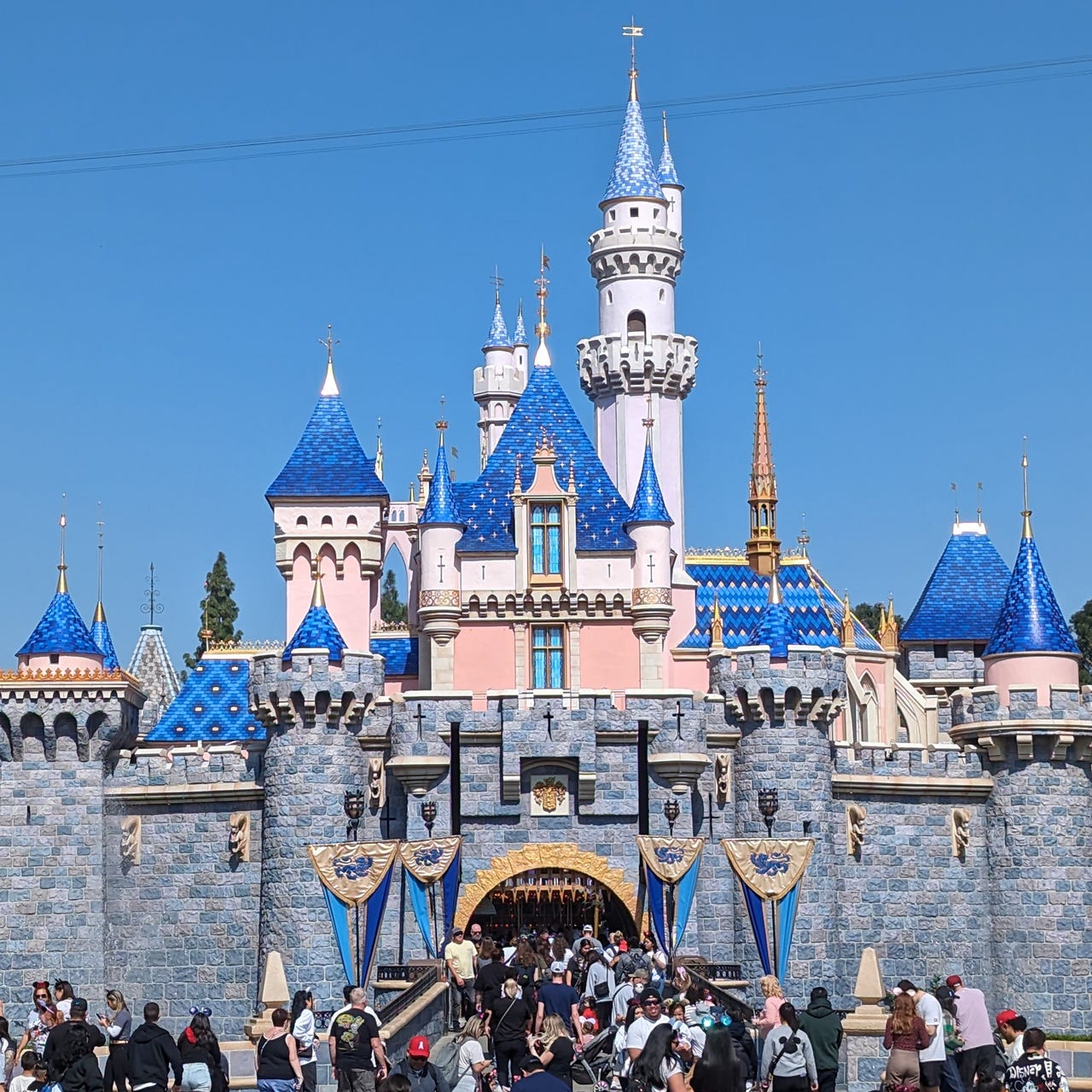Disney Adults Are the Antifascist Resistance
Join in the fight where you are.
In Trump’s second term, universities, corporations, media, the Supreme Court, and even the supposed opposition party have all fallen over themselves to genuflect before the whims of a grotesque, incoherent, violent fascist dictatorship. As institution after institution and leader after leader bends the knee, it can be easy to feel like nothing can be done, and that the new orange reich is going to last, if not 1000 years, then at least long enough to destroy most of the people, ideals, and institutions that make this country even vaguely livable and worthwhile.
The thoroughgoing debasement of our elites is consequential and miserable. But it’s not the whole story. Trump’s popularity is terrible; he’s 11 points underwater, and even Republicans are increasingly pessimistic about the direction of the country. As pollster G. Elliott Morris said, this weekend, “the percentage of U.S. adults who say they ‘strongly disapprove’ of Trump‘s job as president (about 46-50% of adults) is significantly higher than the percent of adults who voted for him (about 32% of adults).”
There is a lot of anger at Trump and a great deal of fury about what he is doing to the country. There is a lot of potential for popular resistance; it just requires a spark. And one spark in the last week was Trump bullying ABC/Disney into firing late-night host Jimmy Kimmel.
—
Everything Is Horrible is entirely reader supported. That means that I rely on you to keep me scribbling. It’s a tough time for independent journalists, so if you find what I do valuable, please consider becoming a subscriber. It’s $50/year, $5/month.
Disney, cancelled
Reporting on the decision to fire Kimmel suggests that even Disney execs did not think Kimmel had said anything wrong. bBut they were “pissing themselves” in fear of government retaliation. The decision to yank Kimmel was done quickly, out of panic, without considering the possible downsides of collaborating with a fascist regime.
Those downsides, though, quickly turned out to be substantial. Users of Disney’s Disney+ and Hulu streaming services have been cancelling in droves—on such user being Disney She-Hulk star Tatiana Maslany, who posted urging others to boycott the company. Star producer and director Damen Lindeloff said he will not work with Disney unless they reinstate Kimmel, and other stars are reported to be contemplating similar pledges. Writer’s Guild members protested outside Disney’s offices. Even former Disney head Michael Eisner has lambasted the company. The public blowback has led Disney’s stock to plummet by $3.8 billion.
The streaming losses and a potential talent boycott are both damaging. But the thing that’s really probably making the suits quake in their suits is the growing organized boycott by Disney adults.
Disney adults are (like the name says) adults who identify strongly with the Disney brand, and devote substantial amounts of their disposable income on Disney cruises, Disney parks, and Disney paraphernalia. Individuals can spend tens or hundreds of thousands of dollars annually with Disney—and influencers can spend hundreds and thousands of hours promoting the parks and products.
Those influencers, though, are furious at Disney’s collaboration with fascism. An excellent report at Glamour singles out Stephanie Cuevas, a queer, Latina Disney adult with tens of thousands of followers on Instagram and TikTok who says she will no longer make Disney content.
Another Disney adult devoted their Tiktok to reading On Tyranny and urged followers to cancel their Disney subscriptions and trips;; there are reports of a third cancelling a $150,000 wedding.
Disney adult identity politics
Inevitably, the Disney adult boycott has led to some good natured (and some not so good natured) ribbing. Children are in many ways a stigmatized group; adults who are passionate about children’s entertainment are also inevitably stigmatized and ridiculed. Disney adults have also often in the past been pilloried for forming an identity around a corporate conglomerate. As one article, explains, “According to the internet,[Disney adults are] self-absorbed, indulgent grown-ups who are obsessive about Disney and refuse to face reality.”
Rather than seeing Disney adults as pathological or deluded, though, you could instead simply see them as people who have formed a community or a club. A certain strain of sociological nostalgia laments the loss of bowling leagues and civic associations, and worries that the breakdown of these kinds of institutions has eroded civil society and democracy. Disney adults are obviously not in a bowling league—but they are in an affinity group based around shared interests and they organize shared events, both online and in person. Why is a bowling league more civically impactful than a group of people getting together to talk about how much they love Encanto, or to join a cruise? Is it because the Encanto fans are more likely to be queer? (Note that this is not meant to erase queer bowlers; my daughter is one!)
A Disney adult is also, arguably, an identity. There’s a lot of discomfort on the right, center, and left with the idea of people organizing politically around identities—especially marginalized identities. The worry is that identity politics function as a barrier to mass politics or to unifying national or (on the left) class politics. By focusing on the concerns of a minority, the criticism goes, identity politics creates divisions and weakens demands for policies which uplift us all. We should organize around universal values (the assumption being that such exist) rather than around narrower parochial concerns.
I’ve written before about why I think this critique is foolish in regard to marginalized identities. I think the current revolt of the Disney adults also helpfully underlines the way in which particular investments, and particular identities, often serve not to divide people, but to connect them to larger struggles.
Fascism is a totalizing vision. But repression focuses on particular institutions and individuals as it builds towards complete control. Communities, groups, and institutions in the path of fascism have opportunities to resist—and those opportunities often take the form of saying something like, “This is not who we, as Disney adults, want to be.”
Resistance builds resistance
As it happens, this is an instance where the antifascist resistance may really be successful. Disney again did not plan for this backlash, does not seem to believe that Kimmel did anything wrong, and may well be bullied into doing the right thing despite itself.
Even if Disney doesn’t reinstate Kimmel though, the huge backlash here is a powerful message. So far, many media outlets have simply caved in the face of Trumpian pressure, paying him bribes or firing staff to appease him without worrying about consumer backlash or possible antifascist objections. The scale of the resistance here, and the signs that it is growing rather than moderating, gives media oligarchs some incentives to balance out Trump’s bullying. FCC threats can be dangerous to a business. But so can having your superfans turn on you.
It may seem odd to have Disney adults as (one) vanguard of the resistance. But this is what happens when you face a fascist government that wants to control everything you do or think. Fascism’s drive to subjugate everything and everyone is often seen as a source of strength (not least by fascists.) But the effort to turn all institutions into fascist institutions inevitably means that a lot of people who weren’t necessarily focused on politics suddenly find themselves having to make stark choices about who they are and who they want to be.
Most people don’t want to have Trump at the center of every aspect of their lives. Disney adults have that figured out. It would be good if other, more powerful institutions—like, say, Disney itself, or the Democratic party—would follow their lead.




Disney adults was not on my radar. Thank you for this. Not only is it a bright spot in the hellscape of current news but it gave me the nudge I needed to cancel my own subscription.
They aren't going to change their political strategy unless their pocketbook is affected. This was done earlier with Tesla, but Disney is not a one-business company, so it will not easily be threatened with bankruptcy by the actions of one group of people.